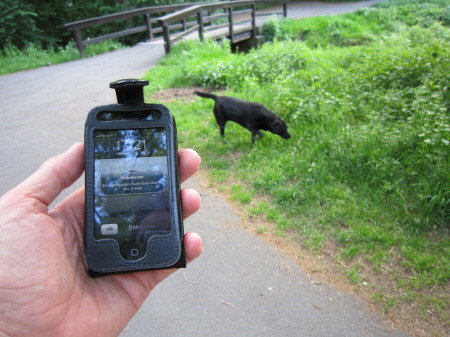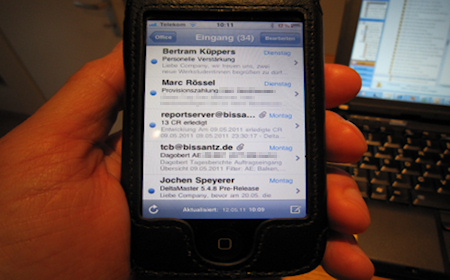Managers receive more information than they can take in. In fact, their information absorption capacity is the main bottleneck in Business Intelligence. Here are a few ways we can increase it.
From 1993 until 1995, I worked as a research assistant for Professor Peter Mertens, the pioneer in the field of information systems. As is common practice, we gave joint lectures at that time (and later as well). Our topic was how computers can support managers in their work. Each of our lectures included the following quote from the Nobel Prize winner Herbert A. Simon: “Information is not scarce. Scarce is manager’s time to attend to all the information that is available.” That basically says it all.

Controlling by hearing: Each new registration for our Executive Forum in Berlin entered my perception as an audio signal – no matter when or where.
A manager’s information absorption capacity is limited. Simon already said that in 1973. Back then, management information consisted of endless stacks of green-and-white-striped paper covered with numbers. Dialog systems and OLAP databases are wonderful, but they don’t change a manager’s capacity to absorb information.
What we can do is still the same. First: A computer can help filter the existing information. Although that is a good idea and we have made some real progress, it is still full of pitfalls. The gauges, traffic lights, and dashboards that we regularly criticize in this blog show how you can easily get carried away with filters. Second: We reduce wasted capacity caused by enigmatic charts, embellishments, and anorexically thin reporting. High-integrity, data-dense reporting, among our favorite topics, helps greatly. The potential to increase the information throughput in this way is immense – and that is our focus. Third (and particularly fascinating): We simply increase the capacity. How? Here is an example from our own company.
Project controlling: Executive Forum, Berlin, in 2011
Every two years, we host an Executive Forum where we discuss the future of Business Intelligence with managers. The event’s framework and objectives are ambitious, and a lot of effort goes into the preparations. As the hosts, we of course want to have a full house. Our staff work very hard on this but shouldn’t make compromises with regards to the target group. Last time, the mountaineer Reinhold Messner was our guest speaker. I wanted to show that we could apply certain lessons from the master of intuitive risk management to business management as well. That is definitely of interest to executives, supervisory board members, managing directors, and LOB managers who can take their minds off their daily business long enough to reflect on topics that could develop in the long term.
Since I planned the framework and moderated the event, I was interested and motivated to learn about the ongoing registration status in the long weeks prior to the event. I got a buzz with every new registration.
Notification through ring tones
We set up our company’s own controlling system so that it regularly checked the number of registrations and sent a notification to my smartphone each time there was a change. No matter where I was, a special tone (or several of them) told me in virtual real time if there had been one or more additional registrations.

Small change, huge difference: E-mail header with key information in the subject line
First experiences from a personal experiment
I was thrilled at how effective this simple concept was. I personally felt that my ears understood things faster than my eyes. I processed the information “two tones = 2 new registrations” in a way as if the sounds had been wired directly to my brain. And I received the information without having to waste precious management capacity. I didn’t have to think about retrieving a report or taking the time to read it. The information was positive and important for me – and it was able to kindle its motivating effect as early as possible. I have my smartphone constantly in my hand anyway, so reading off the additional written status on the total number of people who had registered didn’t require any additional effort.
Seeing is understanding
In fact, I was so motivated that I searched for other possibilities to increase the capacity. Part of our controlling concept includes reports that are sent as e-mails at set times. At first, the subject line merely stated the content of the report. To learn more, I had to open the e-mail, which was like taking a detour. Now, all of our e-mail reports list one or more selectable measures in the subject line. The effort required to process “You’ve got mail” and “Orders received today: 347,000” are thus identical. Once again, I have the feeling that there is a wired connection between the information and my brain as well as my perception and understanding.
I can tell you one thing: Financial controlling can be really nice.
